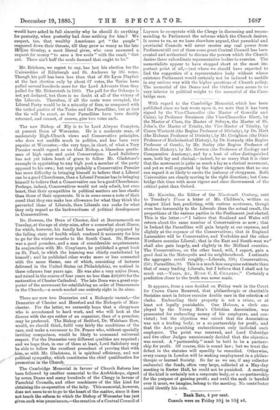The Cambridge Memorial in favour of Church Reform has been
followed by another memorial to the Archbishops, signed by seven Deans and many hundreds of the Clergy in favour of Parochial Councils, and other machinery of the like kind for obtaining the co-operation of the laity. This memorial, however, does not seem tons to go to the heart of the matter, since it does nottonch the reform to which the Bishop of Worcester has just given such wise prominence,‚ÄĒthe creation of a Central Council of Laymen to co-operate with the Clergy in discussing and recom- mending to Parliament the reforms which the Church desires. It seems to us, as we have elsewhere argued, that parochial and provincial Councils will never receive any real power from Parliament till out of them some great Central Council has been created and authorised to discuss the powers which the Church desires these subordinate representative bodies to exercise. The memorialists appear to have stopped short at the most im- portant point of all,‚ÄĒjust where we should have expected to find the suggestion of a representative body without whose existence Parliament would certainly not be induced to meddle in any serious way with the higher questions of Church policy. The memorial of the Deans and the Oxford men seems to us very inferior in political weight to the memorial of the Cam- bridge men.










































 Previous page
Previous page